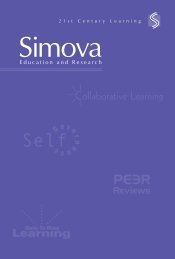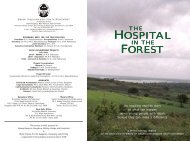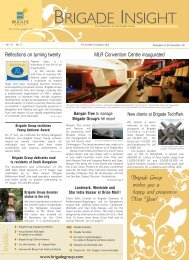Janaagraha - Resource Communications Pvt. Ltd
Janaagraha - Resource Communications Pvt. Ltd
Janaagraha - Resource Communications Pvt. Ltd
Create successful ePaper yourself
Turn your PDF publications into a flip-book with our unique Google optimized e-Paper software.
J A N A A G R A H A’ S VA L U E S , P U R P O S E A N D V I S I O N<br />
CORE VALUES<br />
Positivity: To believe that real change is possible, if everyone did his or her bit.<br />
Belief in the power of the community: To recognise that the central means of all action<br />
is a collective one. From an inclusive community comes collective strength, and also the<br />
building of long-term bonds that will shape our society.<br />
Constructive Engagement: To engage (with individuals, communities and organisations)<br />
in the spirit of partnership and give the benefit of doubt until proven otherwise.<br />
Professionalism: To deliver on individual roles and responsibilities at the highest<br />
degree of commitment and capability at all times.<br />
Moral Compass: To consistently be guided in all actions by the principle of moral truth<br />
and be concerned with not just the ends but the means as well.<br />
Compassion: To empathise with and support those in real need and carry out one's<br />
responsibilities in building a caring and just society.<br />
CORE PURPOSE<br />
To improve the quality of life for all by improving the quality of public governance.<br />
VISION 2025<br />
To fundamentally transform the trajectory of our country, in 20 years.<br />
VIVID DESCRIPTION<br />
Twenty years from now, India will be best known for the quality of life it offers to its<br />
citizens. And this will be accomplished through the practice of democracy that is<br />
based on personal freedom, collective action and transparency. A democracy, that<br />
provides every citizen with a direct voice and an active role in public governance,<br />
leading to an abundance of public and private wealth.<br />
This vision for India would be achieved by developing participatory structures of<br />
public governance, by evolving a sense of shared ownership of the environment and the<br />
community's destiny and by establishing practices of engagement that ensure broad<br />
participation in public governance, of the entire citizenry.<br />
India would provide to the world a model of democracy that brings individual<br />
ambition and common cause into harmony, and helps unleash the creativity of millions<br />
of Indians in ways that generate the greatest rewards for the society as a whole. By<br />
2025, no Indian would have reason to feel disenfranchised and in fact would<br />
have every chance to fulfill his/her personal potential while making the greatest<br />
possible contribution to the society.<br />
E V O L U T I O N O F J A N A A G R A H A<br />
<strong>Janaagraha</strong> started in December 2001, with the conviction that citizen participation is<br />
central not just for greater accountability of government, but for better-quality<br />
governance, to equitable outcomes and to collective ownership. The focus of<br />
<strong>Janaagraha</strong>’s work is urban India and Bangalore has been the pilot laboratory for our<br />
grassroot activity. Our first campaign—participatory budgeting in the ward—proved<br />
overwhelmingly that people do care and want to participate—so long as the process is<br />
scientific, fair and transparent.<br />
The geographic footprint of participation that <strong>Janaagraha</strong> focuses on is that of local<br />
government and within that, it is the Ward. This is because the ward is the smallest<br />
political unit of local government with an elected representative, and hence has<br />
accountability closest to the people.<br />
Since that first campaign, we have been deepening and expanding our grassroots<br />
experiences and comparing them to larger ideas about democracy and democratic<br />
processes. This journey of understanding democratic ideals, institutions and<br />
processes—locally and globally—and the role of citizens, is a continuous one. We strive to<br />
constantly reflect this continuous learning in our activities.<br />
<strong>Janaagraha</strong>'s work is fundamentally about two things:<br />
1. Creating new politically legitimate space at the local level, which includes all<br />
citizens in the process of decision-making. That is, deepening the idea of<br />
democracy beyond the occasional trip to the ballot box, and providing the<br />
citizen with an on-going right to have a voice in decisions that affect her.<br />
2. Strengthening the ability of the two central political players—the citizen and<br />
elected representative—to participate in these spaces. This means evolving robust<br />
structures, processes and tools for such participation.<br />
Our experiences have shown that passion, conviction and ideas in grassroot activity<br />
bring best results when they are in tandem with stable organisational structures and<br />
processes. <strong>Janaagraha</strong> has evolved in these last four years from being an open citizens'<br />
platform to the more rigorous institutional structure called the <strong>Janaagraha</strong> Centre for<br />
Citizenship and Democracy (JCCD).<br />
While the "idea" of democracy is a<br />
romantic one—of free speech, fair<br />
elections, checks and balances—the<br />
actual "practice" of democracy is<br />
more mundane—the simple,<br />
regular, organised forms of local<br />
engagement.















